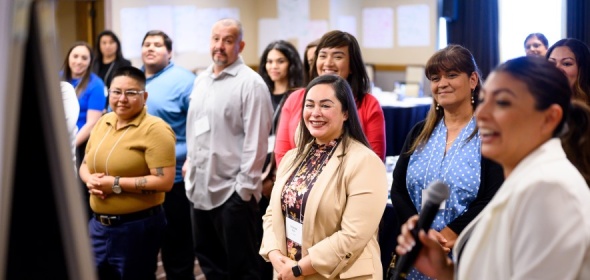By Jessica Thacher, MPH and Caron Lee, MS
Pictured: M2L cohort 6 at a program seminar in May 2023 (photo credit: Noah Berger).
In 2023 Cedars-Sinai’s Community Benefit Giving Office commissioned Jess Thacher Consulting to evaluate the Managing to Leading (M2L) program that is administered by Healthforce Center at UCSF. This is an abridged summary of the evaluation’s impact and participant success findings.
The Cedars-Sinai Managing to Leading (M2L) program is a year-long leadership development experience for mid-career clinical and administrative staff at eligible community clinics in Los Angeles County. It includes four multi-day leadership seminars, peer coaching and networking, and application of learnings via project design. It is funded by Cedars-Sinai and is designed and administered by Healthforce Center at UCSF. Between launching in 2015 until May 2023, there were five M2L cohorts totaling 132 graduates.
Program Impact
M2L improves participant leadership capabilities. Ninety-nine percent of alumni and 89% of supervisors reported the program improved leadership capabilities somewhat or to a great extent. Alumni experienced the greatest improvements in confidence, self-awareness, and communication skills. Significant improvement was also reported in strategic thinking, project planning, and change management.
Alumni professionally advance within their health centers. More than three out of four alumni from cohorts one through four reported having greater authority in their positions than they did when they started the program, and 92% believe the program influenced their advancement at least somewhat.
M2L alumni impact their organizations as more competent team, project and program leaders, and their M2L projects directly impact their organizations. Examples of M2L alumni organizational impacts include: opening a new health center, establishing a behavioral health department, coaching and mentoring staff, improving workflows, leading strategic planning, and achieving organizational, grant and quality goals. Greater than 80% of supervisors and alumni said the M2L project at least somewhat impacted their organization. Projects that were supported by leadership and aligned with organizational priorities were the most successful.
“At the start, I didn’t feel like I was a natural leader. The seminar opened by explaining there is no such thing as a natural leader; it’s something you work at. That really resonated with me. The program will prove to you that you’re a leader and improve your leadership.” – Cohort 5 Alum
M2L reinforces alumni commitment to the safety net. Ninety-two percent of alumni who completed the evaluation survey have continued to work in the LA health care safety net since their M2L graduation, and 85% say they are committed to dedicating their career to the safety net. Eighty-eight percent of alumni say that M2L has supported their continued work within Los Angeles community health centers.
M2L strengthens the community health center ecosystem in LA. Ninety-three percent of M2L supervisors that completed the evaluation survey believe that the program strengthens the LA health care safety net. Supervisors shared that the program connects participants to the broader health center movement and develops the leaders needed to replace those who move on or retire from LA clinics.
“I am extremely thankful for the opportunity to participate in the M2L program. Because of it, I was able to learn a variety of new skills that I could immediately put to use in my management and project delivery.” – Cohort 3 Alum
Participant Success
M2L is appropriate for a wide range of mid-level health center leaders. Past participants were diverse across a number of variables, and this diversity strengthened the program.
- Education levels ranged from high school degree or some college (36%) to bachelor’s degree (23%) to masters, doctoral or professional degree (41%).
- Positions represented ranged from director, manager, supervisor/lead, program/project manager, and coordinator/specialist, as well as reflected various areas and departments – clinical (medical, dental, behavioral health), front and back office, development, finance, IT, and quality.
“It is too easy to be weighed down with the large amount of everyday work and miss supporting people’s growth. As people move on/retire it is important to keep growing our internal staff. These programs are so important.” – M2L Supervisor
Participant characteristics that align with positive and meaningful experiences include:
- Self-awareness and desire to grow
- At least a year of experience working at a community health center
- Communicating regularly and effectively with supervisors
- Having supervisory (or equivalent) experience
- Having protected time to participate (clinical participants need administrative FTE)
Strong engagement from supervisors and other leaders increases participant success. Best practices include: provide protected time to fully participate in the program, rebalance workload, check-in regularly, provide project support, and involve HR or other leaders (in addition to support provided by the participant’s direct supervisor).
Health centers may benefit from having an organized internal process for nominating candidates to M2L. This establishes transparency and a sense of fairness in how M2L applicants are selected, and helps ensure the participants selected to attend are qualified and well-positioned to be successful in the program.
“This program gave me a chance to see across silos.” – Cohort 4 Alum
IM2L is now accepting applications for its next cohort. Please see details and apply by March 15, 2024.
